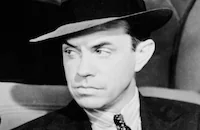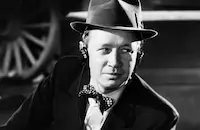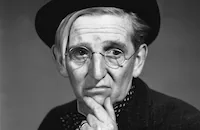It Happened Tomorrow

Brief Synopsis
Cast & Crew
René Clair
Dick Powell
Linda Darnell
Jack Oakie
Edgar Kennedy
John Philliber
Film Details
Technical Specs

Synopsis
On the occasion of their golden wedding anniversary, Larry and Sylvia Stevens argue about Larry's wish to publish his story about a miracle that occurred fifty years earlier: Near the end of the nineteenth century, Larry, an obituary writer on the Evening News , has just been promoted to reporter and brashly boasts that he would give ten years of his life in exchange for knowing tomorrow's news. Pop Benson, the paper's sage librarian, warns him that it can be dangerous to know the future. After leaving the office, Larry and several reporters see a poster promoting Oscar Cigolini, the fortune-teller, and his niece, Sylvia Smith, and decide to attend the show. Smitten, Larry invites the beautiful Sylvia to lunch the next day. Later that evening, as Larry passes the Evening News office, he hears Pop call his name. Stepping out of the shadows, Pop hands Larry a copy of the paper and then disappears into the night. Larry sticks the paper into his jacket pocket and forgets about it until the next morning when an unemployed friend borrows it to read the classified ads. Stunned to read about an unseasonal snowfall that is happening just at that moment, Larry sees a story about a robbery at the opera house that afternoon and realizes that the edition is forecasting the day's events. He then hurries to the paper's office to beg Gordon, his editor, to allow him to cover the concert. When Sylvia arrives for their lunch date, Larry invites her to join him at the concert. As they listen to the performance, three bandits rob the box office and Larry scurries back to the paper with his written account of the robbery. Gordon refuses to believe Larry's story until Inspector Mulrooney appears at the newspaper office to confirm the theft. When Mulrooney becomes suspicious of Larry's intimate knowledge of the holdup, Sylvia tries to protect him by claiming that she predicted the crime. After jailing Larry, Mulrooney accompanies Sylvia back to the theater and asks her for another prediction. To prove her psychic abilities, Sylvia foretells of a woman jumping to her death from a bridge spanning the river. Meanwhile, at the police station, Larry hears Pop calling to him from outside his cell window. After directing Larry to the river to save a woman's life, Pop reads him the next day's news about the bandits' arrest at the Union Bank. Larry is released after he informs the police that the bandits can be found at the Union Bank, and hurries to the river, arriving just after a woman has plunged into the water. Diving in after her, Larry finds Sylvia clinging to a boat, and she explains that she was trying to prove her credibility by making her prediction come true. After pulling her to shore, Larry takes the water-logged Sylvia to his apartment, lends her a dry suit of clothes and then escorts her home. Having left her keys behind, Sylvia sneaks in through an open window, and when her neighbors see the figure of a man in her room, they suspect that she has a lover and inform Cigolini. Cigolini bursts into his niece's room, and upon finding a man's suit hidden under the bed, assumes that Larry has just fled out the window. Larry, meanwhile, delivers the story of the bandits' capture to the Evening News . When he brags that he can foretell the future, the other reporters goad him into picking the winners at the race track the next day. After scouring the library for Pop, Larry finally finds him in the alley and begs him for one last paper. Confident of his impending wealth, Larry then goes to the theater to propose to Sylvia. Larry's proposal placates the angry Cigolini, who questions Larry's ability to support his niece. When Larry boasts that he will win $100,000 at the race track the next day, Cigolini insists on accompanying him there. That night, after scrutinizing the next day's race results on the back page of the paper, Larry is stunned to read the front page account of his death at the St. George Hotel at 6:25 the next evening. Distraught, Larry collapses and awakens to find himself in the hospital the next morning. Resolved to accept his fate, Larry marries Sylvia and then determines to leave her a rich widow by winning at the track. As horse after horse wins, Larry collects his winning from bookie Jake Schomberg but becomes more depressed, now certain that the day will end in his death. On the carriage ride back to town, Shep, a cohort of Schomberg's, snatches Larry's wallet and flees. Larry returns to the newspaper office to ask for Pop's advice, and there learns that Pop died three days earlier. When Larry glumly confides to Gordon that he expects to be sent to the St. George Hotel, Gordon insists that he follow his instincts and go there. Near the hotel, Larry spies Shep and fearlessly chases him across the rooftops. On the roof of the St. George Hotel, the two fall through the chimney and into the lobby where Shep pulls out a gun. When the police see a man brandishing a gun, they rush into the hotel, and Shep begins to fire at them. After Larry collapses in fear, the police shoot and kill Shep. Finding Larry's wallet in his pocket, they assume that Shep is the reporter and notify Gordon, who publishes the story of Larry's death on the front page. Upon regaining consciousness, Larry is so relieved to be alive that he doesn't care that his wallet is now empty. As it begins to pour outside, Sylvia predicts a long, happy future together and imagines their golden anniversary party. The newlyweds then walk out into the rain, using the edition of the Evening News as their umbrella and dreaming of their golden wedding anniversary.

Director
René Clair
Cast

Dick Powell

Linda Darnell

Jack Oakie

Edgar Kennedy
John Philliber

Edward Brophy
George Cleveland

Sig Ruman

Paul Guilfoyle
George Chandler

Eddie Acuff

Marion Martin
Jack Gardner
Eddie Cole
Robert Homans
Emma Dunn
Robert Dudley
Ethel Griffies
Earle Hodgins
Robert Emmett Keane

James Conlin
Dorothy Vaughn

Fern Emmett
Luis Alberni
Mary Field

Charles Halton
Stanley Andrews
Harry Hayden
Eileen Janssen
Patsy Nash
Crew
T. W. Baumfeld
René Clair
Lord Dunsany
Lewis R. Foster
Helene Fraenkel
Carley Harriman
Renè Hubert
Henry Kesler
Emile Kuri
Ted Larson
William Lynch
Erno Metzner
Dudley Nichols
Arnold Pressburger
Fred Pressburger
Guy Roe
Eugen Schufftan
Howard Snyder
Robert Stolz
Archie Stout
Hugh Wedlock
Jack Whitney

Videos
Movie Clip



Film Details
Technical Specs

Award Nominations
Best Score
Best Sound
Articles
It Happened Tomorrow
The screenplay credit for It Happened Tomorrow lists both Rene Clair and Dudley Nichols and a notation that it was "based on originals by Lord Dunsany, Hugh Wedlock and Howard Snyder, and ideas of Lewis R. Foster, with additional dialogue by Helene Fraenkel." According to Clair, the acknowledgement of various contributions was due to the fact that "In Hollywood, they are very cautious about story ideas because of the legal entanglements that can ensue if you get caught copying -- or even appearing to have copied. What happened here illustrates that point. In the early forties, Frank Capra had bought a screenplay...from two writers. Before he went any further on the project, he had the legal department research the property. They went over everything they could think of, and finally they came to just the sort of thing they had been looking for. It was in a one-act play by Lord Dunsany that had been put on in London by Ronald Colman in the early twenties. The two scripts had the same device: the possibility of reading tomorrow's newspaper today. Since Capra knew very well that the Dunsany estate could have made trouble for him, he bought the rights from them...Eventually Capra sold the rights to Arnold Pressburger, who asked me to take over the project. At first I refused, but then I reconsidered and Dudley Nichols and I redid the whole script from scratch. Even so, those two scriptwriters and Lord Dunsany got their screen-credit for the 'original material.'" (from The Films of Rene Clair by R.C. Dale, Scarecrow Press)
In writing their version of the screenplay for It Happened Tomorrow, Clair and Nichols decided to avoid any mention of the current World War and set the picture in the 1890s. They also altered the original concept of Dunsany's play in which the reporter made a deal with the Devil, instead of being granted his wish by a recently deceased newspaper employee. Clair stated in The Films of Rene Clair that "...Dudley and I were very pleased with the solution we finally found to the plot. We didn't want the man to die, as he had in the play, and we finally hit on an idea that came out of our common experience as former newsmen: the early edition had been wrong. The idea isn't even far-fetched -- one of your biggest American newspapers once proclaimed the wrong man had just been elected president by a landslide, when the landslide actually had gone the other way. And that's not all. I myself once lost my first job as a reporter for being responsible for such a mistake happening, when I filed a story that I had made up in some cafe, while precisely the opposite had occurred in reality."
The collaboration between Clair and Nichols was a good one though Clair admitted that his partner's "power of concentration was such that we could work nine hours at a stretch and talk of nothing other than It Happened Tomorrow. I've never known a worker like him. So, in three weeks the decoupage and dialogue were finished. But the mental tension that he demanded of me was such that I was dead tired." (from Rene Clair: Un maitre du cinema by G. Regent and R. Charensol, editions du La table Ronde ).
Initially, Clair had hoped to cast Cary Grant in the role of the reporter Larry Stevens, a part that eventually went to Dick Powell who was just about to break away from his screen persona as a leading man of lightweight musical-comedy films. Just a few months after It Happened Tomorrow, Powell would go for a tougher, much grittier screen image starting with his unglamorized take on detective Philip Marlowe in Murder, My Sweet (1944), followed by several other first rate film noirs including Cornered (1945) and Pitfall (1948).
Clair was never particularly fond of It Happened Tomorrow although he did admit that "The last twenty minutes are the best thing I did in Hollywood." Nevertheless, the film was a popular success for United Artists and garnered two Oscar® nominations; one for Best Music Scoring (by Robert Stolz) and one for Best Sound Recording. Most reviewers were favorable in their assessment of the film, though many, such as James Agee in his review, preferred Clair's earlier, more innovative French films, writing "Students of cinematic style will find many shrewdly polished bits in It Happened Tomorrow to admire and enjoy; and Dick Powell's graceful sportiness and Linda Darnell's new-minted loveliness are two arresting samples of what wise directing can do. But by and large the simple comic pleasures of the picture lose themselves in intricate artifice, until the last half-hour. Then, with the crowded, horse-playful racetrack scenes and with the long, romping cops-and-robbers chase which ends the picture, cinemaddicts will know for sure that this film is the work of Rene Clair, the French cinemagician whose Le Million [1931], Sous les Toits de Paris [1930] and A Nous la Liberte [1931] are among the most inspired screen comedies ever made."
Despite the complimentary but reserved response of the American press, It Happened Tomorrow was a major critical success in France where this excerpt of the review by Carlo Rim in Le Courrier de Paris was typical of the glowing praise it received: "It Happened Tomorrow can shake hands with his [Clair's] best French films...This time, Rene Clair wasn't satisfied with directing a fairytale vaudeville, with applying his rigorous aesthetics of the watchmaker-poet to this or that farce-pretext. Instead, he bravely attacked a subject that Voltaire or Chamisso would have liked, a subject that could equally well have served as a theme for some somber film with philosophical pretensions....Never before has Rene Clair's precise and winged talent been exercised with such mastery. In a balletic rhythm, all the gears mesh perfectly, everything becomes ordered, everything works out with a clarity and an apparent simplicity...A little wine from home that doesn't lose anything in travel."
It Happened Tomorrow would later be adapted for radio on Lux Radio Theatre in 1944 with Don Ameche in the leading role.
Producer: Arnold Pressburger
Director: Rene Clair
Screenplay: Rene Clair, Dudley Nichols (adaptation and screenplay); Helene Fraenkel (additional dialogue); Lewis R. Foster (ideas); Hugh Wedlock (story); Lord Dunsany (play); Howard Snyder (novel)
Cinematography: Eugen Schufftan, Archie Stout
Art Direction: Erno Metzner
Music: Robert Stolz
Film Editing: Fred Pressburger
Cast: Dick Powell (Lawrence 'Larry' Stevens), Linda Darnell (Sylvia Smith/Sylvia Stevens), Jack Oakie (Uncle Oscar Smith aka Gigolini), Edgar Kennedy (Inspector Mulrooney), John Philliber (Pop Benson), Edward Brophy (Jake Shomberg), George Cleveland (Mr. Gordon), Sig Ruman (Mr. Beckstein), Paul Guilfoyle (Shep), George Chandler (Bob), Eddie Acuff (Jim).
BW-85m.
by Jeff Stafford
SOURCES: The Films of Rene Clair by R.C. Dale, Scarecrow Press
Rene Clair: A Guide to References and Resources by Naomi Greene, G.H. Hall
Rene Clair by Celia McGerr, Twayne Publishers
afi.com
IMDB
Agee on Film, Modern Library
Rene Clair: Un maitre du cinema by G. Regent and R. Charensol, editions du La table Ronde

It Happened Tomorrow
Quotes
Trivia
Notes
According to news items in Hollywood Reporter and New York Times, Frank Capra purchased the original story on which this film is based from Hugh Wedlock and Howard Snyder. When Capra discovered that the story was remotely similiar to the one-act play The Jest of Haha Laba by Lord Dunsany, which was produced in London twenty years earlier, he purchased the rights to the play to avoid a plagiarism suit. After enlisting in the Army, however, Capra sold the rights to producer Arnold Pressburger. Intrigued by the story, René Clair approached Pressburger about directing the film, and the two then enlisted Dudley Nichols to help write the screenplay. Nichols and Clair decided to avoid all references to the war by setting the picture in the 1890s. Although Hollywood Reporter news items list Ralph Linn, Edmund Cobb, Claire Whitney, Bud Jamison, Sam Adams, Frances Morris, Jean Wayne, Herbert Heyes, Pass Lenoir, Kay Linaker, William Forrest, Romaine Callender, Kate Herrington, Chick Collins, Howard Mitchell, Tom Quinn and Bruce Cameron's acrobatic troupe in the cast, their appearance in the released film has not been confirmed. The film received Academy Award nominations in the Music (Music Score of a Dramatic or Comedy Picture) and Sound Recording categories. On July 3, 1944, Lux Radio Theatre broadcast a radio adaptation of the story starring Don Ameche.

Miscellaneous Notes
Released in United States on Video December 8, 1998
Released in United States Spring April 7, 1944
Released in United States Spring April 7, 1944
Released in United States on Video December 8, 1998













